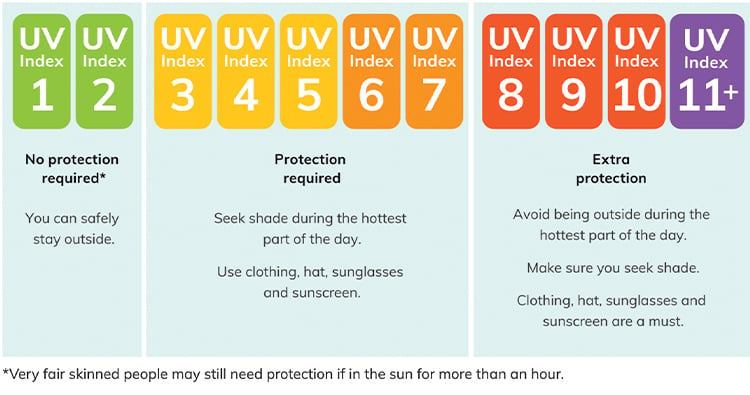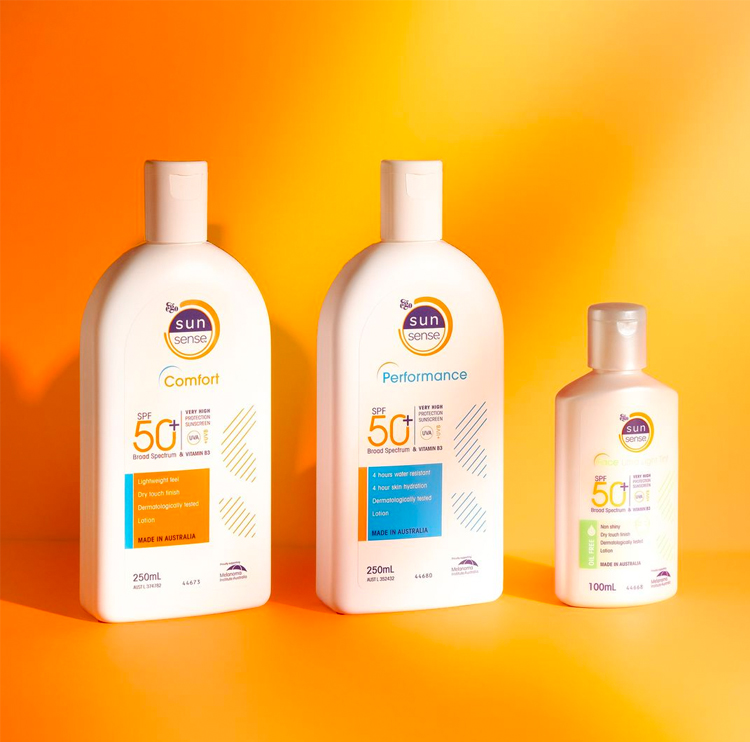Living in a sunburnt country, it’s become second-nature for Australians to use sunscreen daily to help protect ourselves and our kids against the sun’s harsh rays.
And while we’re all pretty familiar with things like SPF, beyond that many of us aren’t sure what else to look for in a sunscreen. So we’ve put together a handy sunscreen guide, including everything from what age to start using sunscreen to the key ingredients to look out for.
A Guide To Sunscreen
How does sunscreen work?
Sunscreen is typically made up of two parts – the active ingredient/s and the emulsion (that’s the lotion, cream or gel etc.). And as the name suggests, the active ingredient/s does all the heavy lifting and helps protect the skin from the sun’s damaging UV rays.
The way that sunscreen helps reduce harmful UV rays from the skin is somewhat technical, but put simply, sunscreen contains substances that either absorb the sun’s ultraviolet (UV) rays or reflect UV rays. By doing this they help stop most of the UV rays from penetrating the skin – and this can help skin from potentially being damaged.
What is UV radiation?
While most of us assume that UV radiation is the heat or sunshine coming from the sun, it’s actually a type of radiation that we can’t see or feel – which makes it particularly nasty. And it’s responsible for 95% of skin cancers in Australia¹.
There are three types of radiation emitted by the sun: UVA, UVB and UVC. It’s the UVA and UVB radiation that contributes to skin cancer, damages the skin, ages our skin and damages our eyes. UVC doesn’t reach us because it’s absorbed by the ozone².

So, why is it important to know what these are? Because we need to keep an eye on the UV index – if it’s at three or above, it’s strong enough to cause damage to your skin. And living in Australia, particularly in the northern states – this is usually most days throughout the year. To help reduce your skin cancer risk, you should be using sun protection on these days.
How much sunscreen should I use?
If you’re a bit clueless as to how much sunscreen you should be using, you’re not alone – around 80% of Aussies don’t apply enough³ (and it can be tricky to get wriggly kids to sit still long enough to make sure they have good coverage!).
Firstly, you need to remember that sunscreen needs time to form a protective barrier on your skin before being exposed to UV rays, so apply it 20 minutes before heading out. Adults should use about 1 teaspoon of sunscreen for their face, neck and ears, another teaspoon for each arm and leg, another teaspoon for the front and one more for the back of the body. That’s seven teaspoons in total. The key is to be generous!
You can also use this handy Sunscreen Calculator to get your ideal application amount.
When should I reapply sunscreen?
Sunscreen should be reapplied every two hours, or more frequently if you’ve been swimming, sweating, exercising or towelling dry.
What is SPF?
We’re all pretty familiar with the term SPF, and looking for the highest possible number on our sunscreens. But what actually is it?
SPF is the sun protection factor, and it measures how much UV gets through the sunscreen’s ‘screen’. It indicates how long it would take to damage the skin. That’s because sunscreen can’t completely block out UV radiation, but it screens out as much as possible.
So, if we look at a sunscreen with an SPF of 50, it means that it allows one fiftieth, or 2% of UV to reach your skin. On the flip side, it means that it filters 98% of UV².
What is ‘broad spectrum’ sunscreen?
Remember the UVA and UVB rays we explored earlier? Broad spectrum sunscreens filter both of those rays – and while UVB is the main culprit for causing skin damage, both increase the risk of skin cancer².
What is a water resistant sunscreen?
If you see ‘water resistant’ on the sunscreen label, it means it shouldn’t come off your skin if you go swimming – but keep in mind you still need to be reapplying every two hours and after exercising, sweating or towelling dry.
What are the key ingredients to look for in sunscreen?
Looking at the ingredient list on sunscreen can be overwhelming – lots of long names! Things like bemotrizinol, phenylbenzimidazole sulfonic acid and titanium dioxide – what a mouthful!
The active ingredients are the ones that do either the absorption or reflecting of the sun’s rays, and these must be listed on the sunscreen label. Examples of ingredients that reflect are zinc oxide and titanium oxide, while UV absorbing ingredients include oxybenzone, octocrylene, 4-methylbenzylidene camphor and butyl methoxy dibenzoylmethane.⁴
What age can I start using sunscreen on my children?
Sunscreen isn’t recommended for babies under six-months, so they should always be protected from the sun using other methods like protective clothing, and staying in the shade.
After six-months, make sure you do a patch test with their very first application, before applying generously and reapplying every two hours or more frequently after swimming, towelling dry or sweating.
Does sunscreen expire?
It sure does! If it’s past its use by date, throw it out and get a fresh bottle!
Get To Know The SunSense Range!

Now that we’re armed with all of this incredible knowledge about sunscreen, it’s time to explore the latest range of SunSense sunscreens. The SunSense sunscreen range provides broad spectrum, SPF 50+ protection to help protect you or your family’s skin all year round. Our products are formulated to be gentle on skin.
The new SunSense range has products suitable for the family, including SunSense Performance SPF 50+, SunSense Comfort SPF 50+ and SunSense Face Ultra Light Tint SPF 50+.
SunSense has been leading with innovation since 1988.
SunSense Performance SPF 50+ has a light, non greasy formula – suitable for use on the body and face. It offers UVA and UVB protection, is water resistant for up to four hours and has been dermatologically tested. With the inclusion of Nicotinamide (Vitamin B3) to help moisturise the skin, it’s suitable for water loving families.
With UVA and UVB protection, lightweight feel and dry touch finish, SunSense Comfort SPF 50+ is an everyday family workhorse! Dermatologically tested on sensitive skin, this non-greasy broad spectrum sunscreen is a great choice for kids on the go!
An invisible-matte, sheer tint sunscreen, SunSense Face Ultra Light Tint SPF 50+ is a mum’s best friend. Offering SPF50+ protection for the face and neck, the oil-free, non-shiny and dry touch finish formula includes Vitamin E and Nicotinamide (Vitamin B3) to help moisturise all skin types.
Australian owned and made, SunSense strives to provide Australian families with expert sun protection care that’s backed by science and exclusive to pharmacies.
SunSense is a proud supporter of the Melanoma Institute of Australia which has a goal of zero deaths from melanoma.
Always read the label and follow the directions for use. Avoid prolonged sun exposure and wear protective clothing, hats and eyewear to further reduce risk. Frequent re-application is required.
Mouths of Mums is proudly partnering with SunSense to bring you this article. The SunSense range is specifically formulated using quality ingredients to provide specialised choices for you and your family.
¹ What is UV Radiation? Cancer Council Victorian (Internet). Available from: https://www.cancercouncil.com.au/cancer-prevention/sun-protection/understanding-uv-radiation/what-is-uv-radiation/
² About SPF50+ sunscreen (Internet) Available from: https://www.cancer.org.au/cancer-information/causes-and-prevention/sun-safety/about-sunscreen/spf50-sunscreen
³ 4 in 5 Australians don’t apply enough sunscreen – are you one of them? (Internet) (13/02/2019) Available from: https://www.cancervic.org.au/about/stories/australians-dont-apply-enough-sunscreen.html
⁴ Sunscreen FAQs (Internet) Available from: https://www.cancer.org.au/cancer-information/causes-and-prevention/sun-safety/about-sunscreen/sunscreen-faqs




















12:28 pm
10:34 pm
8:55 am
10:11 am
12:22 am
6:12 am
7:12 pm
6:49 pm
1:32 am
8:28 pm
9:52 am
2:41 pm
8:14 pm
8:17 pm
1:46 pm
10:01 pm
8:21 pm
8:15 pm
8:50 am
11:10 pm
- 1
- 2
- 3
- »
Post a commentTo post a review/comment please join us or login so we can allocate your points.